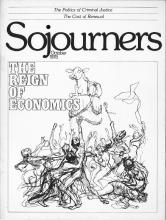Not only the uneducated, but large numbers of the best educated, including government financial experts, find money matters the final mystification.
The "stagflation" crisis of the 1970s forced confessions from the economists themselves. According to former Secretary of the Treasury George Schultz, "We are in a very unusual period, where we more or less cast loose from [economic] beliefs that we once held to be unarguable. We have cast off from a large number of these old moorings, and we have not yet found new ones."
Economics has always had this unpredictable quality, as of a transcendent power operating independently of its human agents. This is not simply a "primitive" impression. The "free will" exercised by modern entrepreneurs--their responsible decisions regarding hiring, expansion, etc.--may in fact arise out of the best personal judgments available to them.
Their individual "free will" decisions, however, are being duplicated by hundreds of thousands of other managers, and "arbitrary" deviations (choices dissimilar to those of competitors) are usually quickly abandoned, as if invisible forces were at work to compel uniformity. The return to the pattern predicted by earlier growth suggests, according to M. Haire, "the operation of inexorable forces operating on the social organism." Perhaps Adam Smith's "invisible hand" no longer operates through competitive enterprises on an open market, but it seems to operate nonetheless.
Read the Full Article

